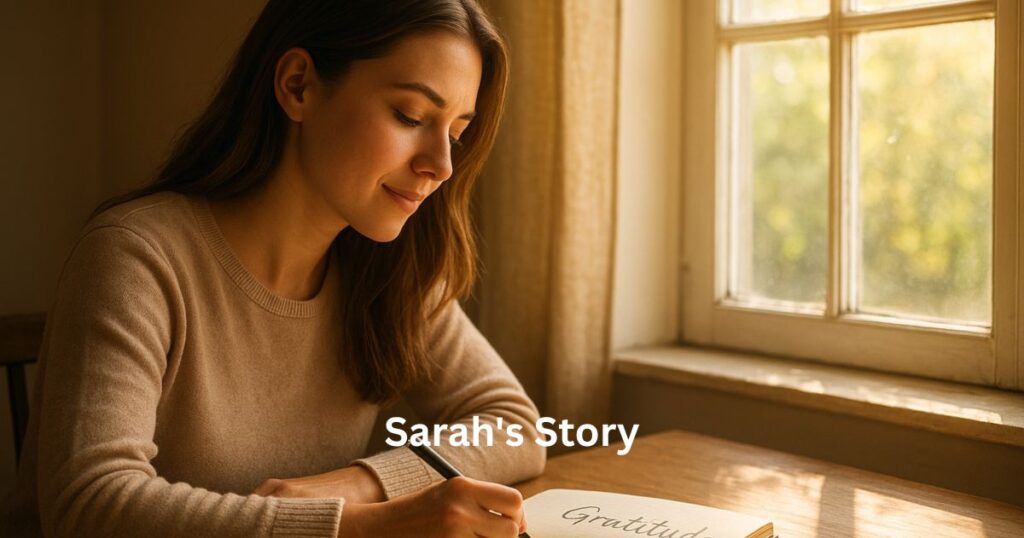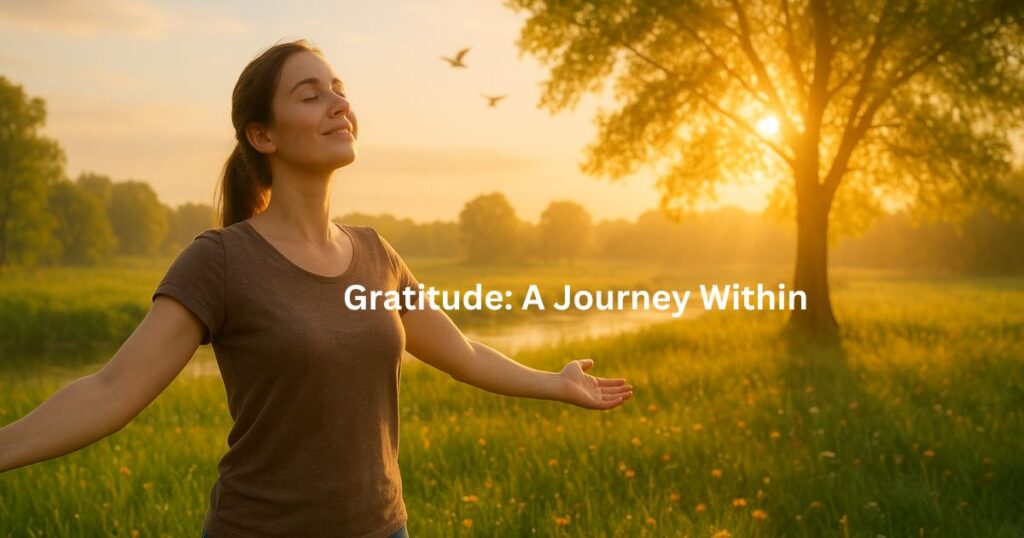Introduction-
We live in a world that never stops. Social media shows us what everyone else has. Our culture tells us to want more, achieve more, be more. In this endless race, we often miss something simple but powerful: gratitude.
Gratitude isn’t just saying “thank you.” It’s a way of seeing life that can change everything. It’s about noticing the good things around you – not just the big wins, but the small moments that make life beautiful. When you truly understand gratitude, you realize you’re not alone in this world. You’re connected to people, experiences, and moments that matter.
What Gratitude Really is
Think of gratitude as a pair of glasses that helps you see clearly. When you put them on, suddenly you notice things you missed before. That friend who always listens. The roof over your head. The ability to read these words right now.
Gratitude does something magical to your brain. Instead of focusing on what’s missing from your life, you start seeing what’s already there. This shift is everything. It’s the difference between feeling empty and feeling full, between anxiety and peace, between loneliness and connection.
Here’s what makes gratitude so powerful: it lives in the present moment. While worry drags you into tomorrow and regret pulls you into yesterday, gratitude brings you right here, right now. And right now is where life actually happens.

Sarah’s Story: From Success to Significance
Let me tell you about Sarah. At 24, she looked successful on paper. Fresh out of college with a marketing degree, she landed a job at a tech startup in downtown Chicago. Her Instagram showed fancy coffee shops, networking events, and late nights at the office. Her parents were proud. Her friends were impressed.
But Sarah felt like she was drowning.
Every morning, she’d wake up to her phone buzzing with notifications. Emails, Slack messages, LinkedIn updates. Before her feet hit the floor, the weight of the day was already crushing her chest. She’d scroll through social media while brushing her teeth, comparing her behind-the-scenes to everyone else’s highlight reel.
The workdays blurred together. Meetings, deadlines, performance reviews. Sarah was good at her job – really good. She got promoted after eight months. Her salary increased. She moved to a better apartment. From the outside, she was winning.
So why did she cry in her car after work most days?
Sarah couldn’t shake the feeling that something was wrong with her. She had everything she thought she wanted, but happiness felt like trying to hold water in her hands – the harder she squeezed, the faster it slipped away.
The turning point came on a Tuesday that started like any other terrible day.
Sarah’s alarm didn’t go off. She woke up 45 minutes late, panicked and stressed. Her coffee maker broke. She spilled toothpaste on her only clean shirt. The train was delayed. By the time she got to work, she was already defeated, and it wasn’t even 9 AM.
That afternoon, her company announced a volunteer program. Sarah almost ignored the email, but her boss mentioned that participating would “look good for career advancement.” Reluctantly, she signed up to spend Saturday mornings at Sunrise Community Kitchen, a local soup kitchen.
Sarah’s first day volunteering was awkward. She didn’t know what to do with her hands. She felt out of place in her expensive sneakers. She was there for the resume boost, not because she cared, and she worried people could tell.
Then she met Maria.
Maria was 67 years old with silver hair and laugh lines that mapped a lifetime of joy and sorrow. She’d been coming to the soup kitchen for two years, ever since her husband died and her fixed income couldn’t cover both rent and groceries. Maria should have been bitter. Instead, she was the brightest person in the room.
“Honey, you look like you lost your best friend,” Maria said to Sarah during their first conversation. “What’s got you so down?”
Sarah found herself opening up to this stranger in ways she couldn’t with her own family. She talked about feeling empty despite having everything she thought she wanted. About the pressure to be grateful for opportunities that felt like golden handcuffs. About not knowing who she was beyond her job title and achievements.
Maria listened without judgment, nodding and humming sympathetically. When Sarah finished, Maria was quiet for a moment.
“Can I tell you something?” Maria finally said. “I used to think happiness was a destination. Somewhere I’d arrive once I had the right house, the right amount in my savings account, the right life. But you know what I learned? Happiness isn’t a place you get to. It’s a practice you do every single day.”
Sarah didn’t understand yet, but something in Maria’s voice made her keep listening.
Over the following weeks, Sarah watched Maria closely. Maria would arrive at the soup kitchen early, always greeting the staff by name and asking about their families. She’d compliment someone’s hairstyle, share cookies she’d baked with her food stamps, and somehow make everyone around her feel seen and valued.
One Saturday, Sarah asked Maria directly: “How do you stay so positive when things are so hard?”
Maria smiled. “Honey, I’ve learned that life isn’t about what happens to you – it’s about what you pay attention to. Every morning when I wake up, before I even get out of bed, I think of three things I’m grateful for. Some days it’s big things, like my health or my grandson calling. Some days it’s tiny things, like the way the light comes through my window or the fact that I slept through the night.”
“But don’t you get angry about losing your house? About struggling to pay for food?”
“Of course I do,” Maria said. “I’m human. But I learned something important: I can be grateful and still want things to be better. Gratitude doesn’t mean pretending everything is perfect. It means choosing to see the good that’s already here while I work on what needs to change.”
That night, Sarah lay in bed thinking about Maria’s words. For the first time in months, instead of scrolling through her phone, she tried Maria’s practice. Three things she was grateful for.
It felt weird at first. Almost fake. But she pushed through:
- The volunteer work was actually meaningful, not just a career move.
- Her apartment was warm and safe.
- She had enough money to buy groceries without stress.
The next morning, Sarah woke up feeling… different. Not transformed – she wasn’t naive – but something had shifted slightly. Like a door had cracked open just an inch, letting in a sliver of light.
She kept up the practice. Three things every night before bed. Some days were easy: a great conversation with a friend, a successful presentation at work, a perfectly ripe avocado. Other days were hard, and she had to dig deep: the fact that her body worked well enough to walk to the train, that she had clean water to drink, that she could afford to heat her apartment.
After a month, something remarkable started happening. Sarah began noticing things during the day that she wanted to add to her gratitude list that night. The way her coworker brought her coffee without being asked. How her mom texted just to check in. The fact that spring was coming and tiny buds were appearing on the tree outside her office window.
The world hadn’t changed, but Sarah’s eyes had.
Her relationship with work began to shift too. She started seeing her colleagues as real people with their own struggles and victories, not just competitors for the next promotion. She began appreciating the skills she was learning, the problems she was solving, the small ways her work actually helped people.
Sarah’s friendship with Maria deepened over the months. They’d talk about everything – Maria’s late husband, Sarah’s dating life, their shared love of old movies and good books. Maria became like a grandmother Sarah never knew she needed.
One day, Maria shared something that changed Sarah’s perspective forever.
“You know, Sarah, when I first started coming here, I was so focused on what I’d lost that I almost missed what I was gaining. I thought my story was over when Robert died and I lost the house. But this place, these people, you – you’ve all become part of my story in ways I never expected. Sometimes the best chapters of your life are the ones you never planned to write.”
Six months after Sarah started volunteering, she made a decision that surprised everyone, including herself. She turned down a promotion that would have meant more money but longer hours and less time for the things that actually mattered to her.
Instead, she found a new job at a nonprofit that paid less but aligned with her values. She kept volunteering at the soup kitchen, not for her resume but because those Saturday mornings had become the best part of her week. She started a gratitude group at work, where colleagues could share what they appreciated about each other and their projects.
The empty feeling that used to follow Sarah around like a shadow began to fade. Not because her life became perfect – she still had stressful days, relationship problems, and moments of doubt. But she’d learned to water the good things with her attention instead of only focusing on what was wrong.
A year later, Sarah received news that Maria had passed away peacefully in her sleep. At the memorial service, person after person stood up to share how Maria had touched their lives. The soup kitchen director said Maria had been the heart of their community. Her grandson talked about how she’d taught him to find joy in small moments. Sarah realized that Maria’s greatest legacy wasn’t what she’d accomplished or accumulated, but how she’d made people feel.
Sarah knew then what she wanted her own legacy to be.
Conclusion: Your Gratitude Journey Starts Now
Sarah’s story isn’t unique. All around us, people are discovering what she learned: that the good life isn’t about having everything you want – it’s about wanting what you already have, while still growing and contributing to something bigger than yourself.
Gratitude isn’t about pretending everything is perfect or suppressing legitimate concerns about your life. It’s about training your brain to notice the good alongside the challenging. It’s about recognizing that even in difficult times, there are threads of beauty, connection, and hope woven into your experience.
Here’s what gratitude can do for you:
It changes your brain. Literally. Neuroscientists have found that regular gratitude practice strengthens neural pathways associated with happiness and well-being. Your brain gets better at spotting positive experiences and feelings.
It improves your relationships. When you appreciate people and tell them so, your connections deepen. Gratitude is like fertilizer for friendship – it helps relationships grow stronger and more resilient.
It builds resilience. Grateful people don’t have fewer problems, but they recover from setbacks faster. When you’re practiced at seeing the good, you’re better equipped to handle the difficult.
It brings you into the present. Gratitude can only happen right now. You can’t be grateful for something in the future (that’s hope) or truly grateful for something in the past (that’s nostalgia). Gratitude anchors you in this moment, which is where peace and joy actually live.
Starting your gratitude practice doesn’t require special skills or equipment. It just requires intention. Tonight, before you go to sleep, think of three things you’re grateful for. They can be big or small, serious or silly. The only requirement is that they’re true for you.
Tomorrow morning, try to notice one thing during your day that you want to add to tomorrow night’s list. Maybe it’s the person who held the elevator for you, or the way the afternoon light looks on your desk, or the fact that your favorite song came on the radio at just the right moment.
Keep going. Day after day, moment after moment. Watch how your vision changes, how your relationships deepen, how your resilience grows.
Gratitude won’t solve all your problems, but it will change how you hold them. It won’t eliminate challenge from your life, but it will help you see the gifts that come wrapped in difficult packages. Most importantly, it will help you realize that you already have so much of what you’re looking for.
Your life is happening right now, in this moment, as you read these words. The question isn’t whether you have enough reasons to be grateful – the question is whether you’re paying attention to them.
The journey of gratitude begins with a single step: noticing one good thing today that you might have otherwise overlooked. From there, the path will reveal itself, one appreciation at a time.


